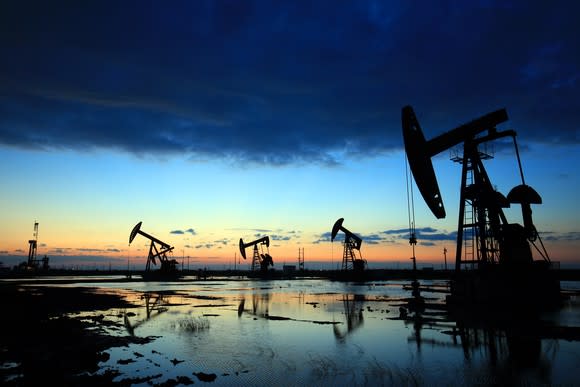3 Things Chesapeake Energy Corporation's CEO Wants You to Know About Its Surprising Addition
Chesapeake Energy (NYSE: CHK) recently stunned investors by agreeing to acquire WildHorse Resource Development (NYSE: WRD) for nearly $4 billion in cash and stock. However, while that deal rattled investors, CEO Doug Lawler couldn't be more excited by what it will do for the company, which was evident in his comments on the accompanying conference call. Here are three things he wanted investors to know about its newest addition.
1. It accelerates our strategy
Lawler stated on the call that "the WildHorse acquisition strengthens and accelerates the delivery of our near-term strategic priorities of margin improvement, sustainable free cash flow, and a net debt-to-EBITDA ratio" of 2. Lawler would go on to point out two numbers that backed up these claims.

Image source: Getty Images.
First, the CEO noted that because higher-margin oil makes up the bulk of WildHorse's current production, the combined company's margins on a per-barrel of oil equivalent (BOE) basis will expand by 35% in the next year and more than 50% by 2020. This improvement led Lawler to point out that "the enhanced margins in oil growth from the WildHorse assets will also have an immediate impact on our financials and balance sheet." He added, "Assuming current strip prices, we expect the incremental EBITDA created by this transaction alone will improve our debt-to-EBITDA ratio, accelerating our de-leveraging efforts by approximately 40% over the next two years." Overall, the company expects its leverage ratio to improve to 3.6 in 2019 and 2.8 by 2020, which pushes it closer to its target of 2.
2. It will double our oil production
Another reason Lawler likes this transaction is that it will "more than double our oil production by the end of 2020, while accordingly increasing our overall oil production mix to 30%." Currently, oil accounts for just 19% of Chesapeake's output. However, by adding WildHorse's 420,000 oil-rich acres in the Eagle Ford Shale -- 80% to 85% of which it has yet to drill -- to its assets in the area as well as its oil-growth engine in the Powder River Basin, Chesapeake will transform into an oil growth machine in the coming years.
In addition to the accelerated oil growth potential, Lawler pointed out a few things specific to Wildhorse that made it an attractive acquisition target. First, as an Eagle Ford Shale producer, its oil fetches a premium price because of its proximity to the Gulf Coast, which gives it a competitive advantage compared with producers in the Permian Basin, for example, where pipeline issues have pushed down regional prices. Those higher prices, when combined with WildHorse's low costs are one reason "WildHorse's EBITDA per BOE is one of the highest of any independent E&P operator in the United States." In other words, WildHorse isn't just an oil producer; it's one of the most profitable ones in the country.

Image source: Getty Images.
3. It provides further upside opportunities
The addition of WildHorse will immediately boost Chesapeake Energy's financial profile and growth prospects. However, Lawler also noted that "we believe there are numerous opportunities to build upon WildHorse's impressive performance and further enhance the return profile of the asset." The CEO pointed out several reasons he sees upside well beyond that near-term boost.
First of all, he noted that the company believes it can achieve an "average of $200 million to $280 million in annual savings over the first five years to be realized through our capital efficient drilling and completion operations in the field as well as improved downtime, lease operating expenses, and the elimination of redundant corporate overhead." The company has high confidence in that forecast, not only because of the increased scale of its operations but also because of its ability to drill longer wells since it will control more adjacent acreage, which will yield stronger drilling returns as well as eliminate additional oilfield service and supply chain costs.
Lawler also noted that "we expect to create additional value through our existing oil transportation options, demonstrating the truly complementary fit with our legacy Eagle Ford position." He said the company plans to look at optimizing its current pipeline agreements to maximize its market access, which should reduce costs and boost earnings.
It makes sense on paper
Lawler laid out a compelling case for the company's decision to buy WildHorse Resource Development, noting that it will accelerate Chesapeake's strategic plan in the near term while providing long-term upside. It's a deal that could pay off big-time if oil prices strengthen in the coming years. However, if crude prices weaken, which has been the case in recent weeks, then the deal might not deliver as much value to shareholders as Chesapeake believes it can.
More From The Motley Fool
Matthew DiLallo has no position in any of the stocks mentioned. The Motley Fool has no position in any of the stocks mentioned. The Motley Fool has a disclosure policy.

 Yahoo Finance
Yahoo Finance 